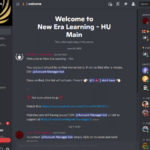Hustlers University Cracked, a term that reverberated through the online world, represents the sudden downfall of a platform that promised to unlock the secrets of success. Andrew Tate, the controversial figure behind the venture, built an empire based on the allure of “hustling,” promising rapid wealth and influence. However, the platform’s rise was met with controversy, leading to its eventual demise.
The leaked content, which purported to be the inner workings of Hustlers University, revealed a complex picture of the platform’s operations. From strategies for online marketing to techniques for building personal brands, the “cracked” content provided a glimpse into the methods promoted within the platform. This revelation sparked a heated debate about the ethics of “hustle culture” and the potential risks associated with the pursuit of rapid wealth.
The Impact of the Leak: A Digital Aftershock
The leak of Hustlers University’s course materials sent shockwaves through the online world, triggering a chain of events that had far-reaching consequences. The immediate aftermath saw the platform shut down and its founder, Andrew Tate, arrested on charges of human trafficking and rape. The leak’s impact, however, extends far beyond these immediate consequences, raising complex questions about freedom of information, online communities, and the very concept of “hustling.”
The Platform’s Shutdown and Tate’s Arrest
The leak, which exposed the inner workings of Hustlers University, led to its immediate closure. The platform, which boasted a large membership base and a significant online presence, was forced to shut down its operations, leaving many subscribers in the lurch. This event, coupled with the subsequent arrest of Andrew Tate, cast a dark shadow over the platform’s reputation and its controversial “hustle” philosophy. The shutdown of Hustlers University, fueled by the leak, highlighted the fragility of online platforms built on questionable practices and the potential consequences of exposing such activities.
The Ongoing Debate: Freedom of Information and Online Censorship
The leak sparked a heated debate surrounding freedom of information and online censorship. Supporters of the leak argued that it exposed the exploitative nature of Hustlers University and its potentially harmful practices. They maintained that the leak served as a public service, exposing the platform’s true nature and preventing further exploitation of vulnerable individuals. Opponents of the leak, however, argued that it violated the privacy of the platform’s members and its founder. They raised concerns about the potential for leaks to be used for malicious purposes and argued for stricter measures to protect intellectual property and personal data. This debate highlights the complex and often conflicting issues surrounding freedom of information in the digital age, particularly in relation to online platforms and personal data.
The Long-Term Implications: The Future of Online “Hustling”
The Hustlers University leak has had a profound impact on the online community, particularly on the concept of “hustling.” The leak exposed the often-exploitative practices behind many “hustle” programs, prompting a reassessment of the value and legitimacy of such platforms. It also raised questions about the ethical boundaries of online entrepreneurship and the potential for exploitation within these communities. In the wake of the leak, many online communities are re-evaluating their approach to “hustling,” emphasizing transparency, ethical practices, and genuine value creation. The leak has also led to increased scrutiny of online “hustle” programs, with platforms and individuals facing greater pressure to demonstrate transparency and accountability. The long-term implications of the leak remain to be seen, but it has undoubtedly shifted the landscape of online “hustling,” pushing for greater transparency and ethical conduct within these communities.
The “Hustlers University” Phenomenon
The rise of “Hustlers University” and its subsequent leak have sparked a conversation about the allure of online platforms that promise quick success and financial freedom. This phenomenon reflects a broader trend in online culture, where self-improvement and entrepreneurship are often presented as achievable through shortcuts and unconventional methods. This section delves into the “Hustlers University” model and its comparison with other platforms, exploring the psychological factors that contribute to their appeal and examining the role of social media and influencer culture in shaping this cultural trend.
Comparison with Other Platforms
“Hustlers University” can be compared to other online platforms that promote self-improvement and entrepreneurship, such as:
- Online Courses and Learning Platforms: Platforms like Udemy, Coursera, and Skillshare offer structured courses in various fields, including business, marketing, and personal development. Unlike “Hustlers University,” these platforms typically emphasize knowledge acquisition and skill development through structured learning materials and expert guidance.
- Business Coaching Programs: Programs like Tony Robbins’ “Business Mastery” or Grant Cardone’s “10X Growth” offer coaching and mentorship aimed at helping individuals achieve business success. These programs often involve high-priced packages, workshops, and one-on-one coaching sessions, with a focus on mindset, strategy, and action-oriented strategies.
- Social Media Communities: Online communities dedicated to entrepreneurship, such as Reddit’s “r/entrepreneur” or Facebook groups, offer a platform for networking, sharing resources, and seeking advice. These communities often foster a sense of belonging and support, but they may also be prone to misinformation and unrealistic expectations.
Psychological Factors
The appeal of platforms like “Hustlers University” can be attributed to several psychological factors:
- The Desire for Quick Success: In a fast-paced digital world, individuals often seek quick solutions and shortcuts to achieving their goals. Platforms that promise rapid wealth and success can be alluring to those who are impatient or seeking instant gratification.
- The “Scarcity” Mentality: Platforms like “Hustlers University” often create a sense of urgency and exclusivity, emphasizing the limited availability of their “secrets” or strategies. This scarcity mentality can trigger a fear of missing out (FOMO), leading individuals to feel pressured to join and access the content.
- The “Guru” Effect: Platforms often feature charismatic leaders or “gurus” who portray themselves as experts and mentors. The admiration and trust placed in these figures can lead individuals to accept their teachings without critical evaluation.
- Social Validation and Belonging: Platforms that foster a sense of community and shared goals can provide social validation and a sense of belonging. This can be particularly appealing to individuals who are seeking connection or feeling isolated in their pursuit of success.
Social Media and Influencer Culture
Social media and influencer culture have played a significant role in the rise of “hustling” as a cultural phenomenon.
- The “Highlight Reel” Effect: Social media platforms often present a curated and idealized version of reality, showcasing only the successes and achievements of individuals. This can create a perception that success is readily attainable, leading to unrealistic expectations and a sense of inadequacy.
- The “Influencer” Mentality: Influencers often promote a lifestyle of luxury and achievement, often presenting themselves as experts in various fields. This can inspire others to emulate their success, leading to a focus on material wealth and status as markers of achievement.
- The “Hustle Culture” Narrative: Social media has amplified the “hustle culture” narrative, glorifying relentless work and sacrifice as the key to success. This narrative can lead individuals to prioritize work and achievement over well-being and personal fulfillment.
The Future of Online Learning
The Hustlers University leak has exposed the darker side of online learning, highlighting the dangers of “get-rich-quick” schemes and the need for ethical and sustainable learning platforms. While the controversy has cast a shadow on the industry, it also presents an opportunity for legitimate online learning platforms to address the needs and concerns of students seeking entrepreneurial guidance. By embracing transparency, accountability, and a focus on genuine skills development, these platforms can build trust and foster a more ethical and sustainable future for online education.
Ethical Considerations in Online Learning
The rise of “get-rich-quick” schemes in online learning underscores the importance of ethical considerations. These schemes often prey on vulnerable individuals, promising unrealistic results and perpetuating a culture of instant gratification. Legitimate online learning platforms must prioritize ethical practices to avoid contributing to this harmful trend.
- Transparency in Curriculum and Outcomes: Platforms should clearly Artikel the skills and knowledge students will acquire, avoiding vague promises of wealth or success. Providing realistic expectations and emphasizing the effort required for success is crucial.
- Disclosure of Instructor Credentials and Expertise: Ensuring that instructors have genuine expertise and experience in the fields they teach builds trust and credibility. Transparent disclosure of instructor qualifications is essential for ethical online learning.
- Focus on Skills Development and Long-Term Growth: Emphasizing the development of practical skills and a long-term mindset, rather than solely focusing on immediate financial gain, is crucial. This approach fosters a more sustainable and fulfilling learning experience.
Creating Ethical and Sustainable Online Learning Communities
Building a thriving online learning community requires a commitment to ethical practices and a focus on long-term sustainability. This involves fostering a supportive and inclusive environment where students can learn, grow, and connect with one another.
- Community-Driven Learning: Encouraging peer-to-peer interaction and collaborative learning fosters a sense of belonging and shared responsibility. Platforms can facilitate this through forums, group projects, and mentorship programs.
- Mentorship and Support Systems: Providing access to mentors and support systems can help students overcome challenges and stay motivated. This includes offering guidance on personal development, career planning, and business strategies.
- Continuous Learning and Skill Enhancement: Encouraging ongoing learning and skill development beyond the initial course is essential for sustainable growth. Platforms can offer alumni networks, advanced courses, and resources for continuous improvement.
Opportunities for Legitimate Online Learning Platforms, Hustlers university cracked
The Hustlers University controversy highlights the demand for credible and ethical online learning platforms that offer practical skills and genuine guidance. Legitimate platforms can capitalize on this opportunity by focusing on:
- Industry-Specific Skills Development: Providing courses and programs that equip students with in-demand skills in specific industries, such as digital marketing, web development, or graphic design.
- Entrepreneurial Education with a Focus on Sustainability: Offering courses that provide a comprehensive understanding of entrepreneurship, including business planning, marketing, finance, and legal considerations.
- Mentorship and Networking Opportunities: Connecting students with industry professionals, mentors, and investors to provide guidance and support.
The Role of Legality and Regulation
The “Hustlers University” leak has highlighted the complex legal and ethical landscape surrounding online education platforms, particularly those that offer potentially harmful or misleading content. While the allure of quick riches may be enticing, it’s crucial to understand the legal framework surrounding online learning and the responsibility of both creators and consumers.
The dissemination of potentially harmful content raises concerns about consumer protection, intellectual property rights, and the potential for fraud. Navigating these gray areas requires a delicate balance between fostering innovation and ensuring ethical practices.
The Legal Framework for Online Education Platforms
The legal landscape surrounding online education platforms is constantly evolving, and there are various regulations that apply depending on the platform’s location, content, and target audience.
- Consumer Protection Laws: Many countries have laws that protect consumers from deceptive or misleading advertising. These laws may apply to online courses that make unrealistic promises or fail to deliver on their claims.
- Intellectual Property Laws: Copyright and trademark laws protect the intellectual property of course creators. Platforms need to ensure that the content they host is properly licensed or authorized.
- Privacy Laws: Data protection regulations like GDPR and CCPA require platforms to handle user data responsibly and transparently.
- Anti-Fraud Laws: Online platforms can be vulnerable to scams and fraudulent activities. Laws prohibiting fraud and financial crimes are applicable in such cases.
Challenges of Regulating Online Content
Regulating online content presents several challenges, including:
- Global Reach: Online platforms operate across borders, making it difficult to enforce regulations consistently.
- Rapid Evolution: The online learning landscape is constantly changing, with new platforms and content emerging frequently.
- Freedom of Speech: Striking a balance between regulating harmful content and protecting freedom of speech is a delicate task.
- Technological Complexity: The vast amount of online content makes it difficult to monitor and regulate effectively.
Potential Solutions for Addressing Gray Areas
Addressing the gray areas of online learning and promoting responsible content creation requires a multi-pronged approach:
- Clearer Regulations: Governments and regulatory bodies need to establish clear guidelines for online education platforms, addressing issues like content moderation, consumer protection, and intellectual property.
- Industry Self-Regulation: Platforms can establish industry standards and codes of conduct to promote ethical practices and responsible content creation.
- Consumer Education: Educating consumers about online learning platforms, identifying potential scams, and understanding the risks associated with certain content is crucial.
- Enhanced Transparency: Platforms should be transparent about their content moderation policies, data handling practices, and financial models.
- Collaboration Between Stakeholders: Governments, platforms, educators, and consumer advocacy groups need to work together to create a safer and more responsible online learning environment.
The “Hustlers University” Debate

The leaked content of Hustlers University has sparked a heated debate about the ethics and effectiveness of its business model. While some see it as a valuable platform for entrepreneurship, others condemn it as a scam that preys on vulnerable individuals. This debate raises important questions about the role of online education, the nature of success, and the responsibility of digital platforms.
The “Hustlers University” Debate: A Perspective on Success and Failure
The debate surrounding Hustlers University is a complex one, with strong arguments on both sides. Understanding the different perspectives can shed light on the nuances of the online learning landscape and the challenges of achieving success in the digital age.
| Supporters’ Arguments | Opponents’ Arguments | Evidence Supporting Each Side | Potential Outcomes |
|---|---|---|---|
| Provides access to valuable information and resources | Promotes get-rich-quick schemes and unrealistic expectations | Some students have reported success in building businesses and generating income | Potential for financial success and entrepreneurial growth |
| Offers mentorship and community support | Relies heavily on testimonials and hype, with limited evidence of actual success | Testimonials from successful students can be found on social media | Potential for disappointment and disillusionment for those who don’t achieve success |
| Emphasizes hustle and hard work | May encourage unethical or predatory business practices | The platform’s focus on self-improvement and hard work resonates with many | Potential for fostering a culture of hustle and competition, potentially leading to burnout or unethical behavior |
| Provides a flexible and accessible learning environment | Lacks accountability and quality control, potentially leading to misinformation | The platform’s online format makes it accessible to a wide audience | Potential for the spread of misleading information and unethical practices |
The Rise of “Hustle Culture”

The term “hustle culture” has become a pervasive force in contemporary society, influencing everything from career aspirations to personal values. It glorifies relentless work, often at the expense of personal well-being, and promotes the idea that success is solely achieved through constant striving and self-optimization. This cultural phenomenon has sparked heated debates about its merits and demerits, raising questions about its impact on individual and societal well-being.
The Cultural Phenomenon of “Hustle Culture”
Hustle culture emerged as a byproduct of the rise of the gig economy and the increasing prominence of entrepreneurship. It thrives on the idea that success is not a matter of luck or privilege, but rather a product of hard work, determination, and relentless pursuit of goals. This mentality has been popularized by social media platforms and self-help gurus, who often portray a romanticized version of the entrepreneurial lifestyle, filled with luxurious vacations and financial freedom. However, the reality for many is often a relentless grind, fueled by the fear of failure and the pressure to constantly achieve more.
The Legacy of Hustlers University: A Cautionary Tale?: Hustlers University Cracked
The rise and fall of Hustlers University, a controversial online platform that promised to teach “hustle” techniques for financial success, has left a lasting impact on the online community and the wider cultural landscape. While the platform garnered significant attention and attracted a large following, its ultimate demise, marked by controversy and legal scrutiny, raises crucial questions about the future of online learning and entrepreneurship.
A Timeline of Hustlers University
The history of Hustlers University can be traced back to its inception in 2021, when it emerged as a popular online community, offering a range of courses and mentorship programs focused on business, finance, and personal development. The platform quickly gained traction, attracting millions of users who were drawn to its promise of quick wealth and financial freedom. However, as Hustlers University’s popularity grew, so did the criticism and scrutiny surrounding its methods and the legitimacy of its claims.
- Early 2021: Hustlers University is founded by Andrew Tate, a controversial social media influencer and former kickboxer, who gained notoriety for his provocative views on masculinity, success, and wealth. The platform initially offered courses on topics such as online marketing, affiliate marketing, and e-commerce.
- Mid-2021: Hustlers University experiences rapid growth, attracting a large and diverse following, including young entrepreneurs, aspiring business owners, and individuals seeking to improve their financial situation. The platform’s success is fueled by Tate’s charismatic personality and his ability to connect with his audience through his controversial yet engaging content.
- Late 2021: The platform faces increasing scrutiny and criticism from various sources, including academics, journalists, and consumer advocates. Critics raise concerns about the legitimacy of the courses offered, the potential for scams, and the promotion of questionable business practices.
- Early 2022: Hustlers University expands its offerings, introducing new courses on topics such as cryptocurrency trading, stock market investing, and real estate. The platform also begins to emphasize mentorship programs, connecting students with “successful” individuals who claim to have achieved financial freedom through the platform’s teachings.
- Mid-2022: The platform’s popularity reaches its peak, with millions of users actively participating in its courses and mentorship programs. However, the platform also faces growing legal challenges, with authorities investigating potential violations of consumer protection laws and allegations of fraudulent activity.
- Late 2022: Andrew Tate and his brother Tristan are arrested in Romania on charges related to human trafficking and organized crime. The platform’s activities are significantly disrupted, and its future remains uncertain.
- Early 2023: Hustlers University effectively shuts down its operations, with the platform’s website and social media accounts becoming inactive. The platform’s demise is a significant event, marking the end of an era for the online learning and entrepreneurship space.
The Impact of Hustlers University
The impact of Hustlers University extends beyond the platform itself, influencing the online community and the wider cultural landscape in several ways. The platform’s rise and fall served as a cautionary tale, highlighting the dangers of online misinformation, the potential for scams, and the importance of critical thinking in the digital age.
- The Rise of “Hustle Culture”: Hustlers University played a significant role in popularizing the concept of “hustle culture,” which emphasizes hard work, ambition, and the pursuit of financial success, often at any cost. The platform’s success and the subsequent controversies surrounding it sparked a debate about the merits and drawbacks of this approach to life and business.
- The Impact on Online Learning: Hustlers University’s success and subsequent downfall raised concerns about the quality and credibility of online learning platforms. The platform’s emphasis on quick wealth and financial freedom, coupled with its questionable business practices, led to a reassessment of the role of online learning in education and entrepreneurship.
- The Role of Social Media: Hustlers University’s popularity and the controversies surrounding it highlighted the influence of social media in shaping public opinion and promoting ideas, both positive and negative. The platform’s success was largely driven by its use of social media to connect with its audience and build a community around its message.
The Hustlers University saga serves as a cautionary tale about the allure of quick success and the dangers of unverified information in the digital age. While the platform’s closure and the ensuing controversy may have ended the Hustlers University experiment, the debate surrounding its methods and the “hustle culture” it embodied continues. The lessons learned from this experience highlight the need for ethical and responsible online learning platforms that prioritize genuine knowledge and personal growth over empty promises of overnight wealth.
The recent leak of Hustlers University’s content has sparked a lot of debate about its legitimacy. Many people are now wondering if they should join, and if so, how. If you’re interested in learning more about Hustlers University and its offerings, you can find out how do i join hustlers university. However, remember that the leaked content might not be representative of the full experience, and it’s important to do your own research before making any decisions.
The recent leak of “Hustlers University” content has sparked debate about the legitimacy of its teachings. Many are curious about the actual courses offered within the program, which is described as a platform for learning “high-income skills.” To learn more about the program itself, you can visit the official website of Hustlers’ University. The leaked materials have exposed a complex system of marketing and sales tactics, raising questions about the ethical implications of such strategies.
The impact of the “Hustlers University” crack is still unfolding, and its long-term effects on the online learning landscape remain to be seen.
The recent leak of Hustlers University’s content has sparked debate about the program’s effectiveness. While some see it as a valuable resource for learning about various hustle strategies, others question its legitimacy. To learn more about the program’s potential and if it truly delivers on its promises, you can explore this article on whether does the Hustlers University work.
Ultimately, the value of Hustlers University’s content depends on individual goals and how effectively individuals apply the knowledge gained.





